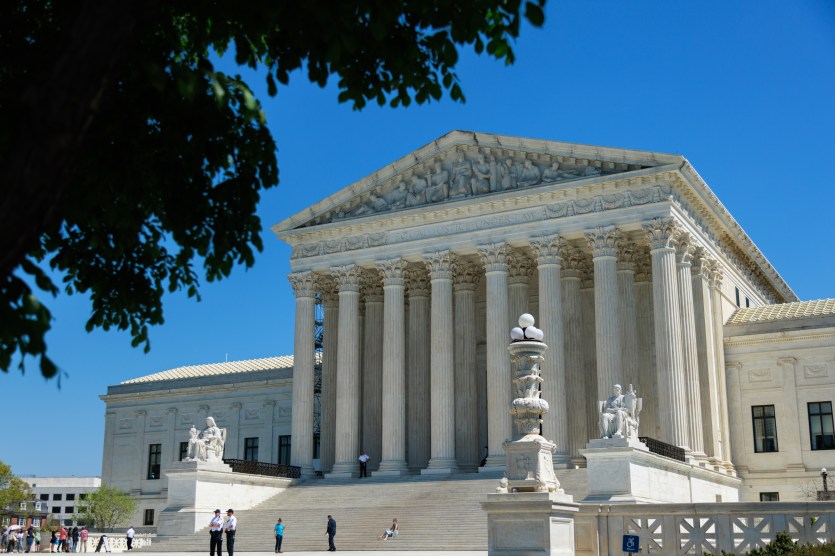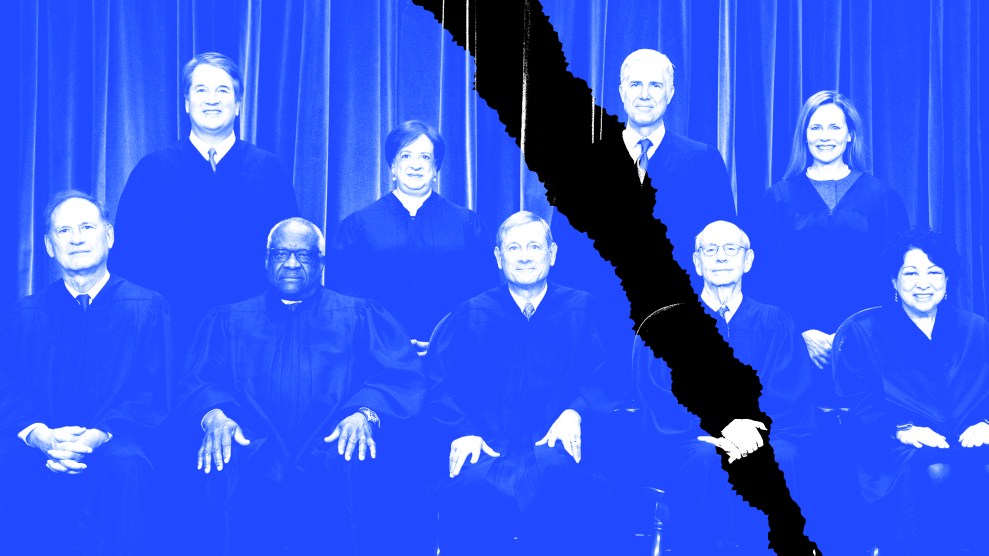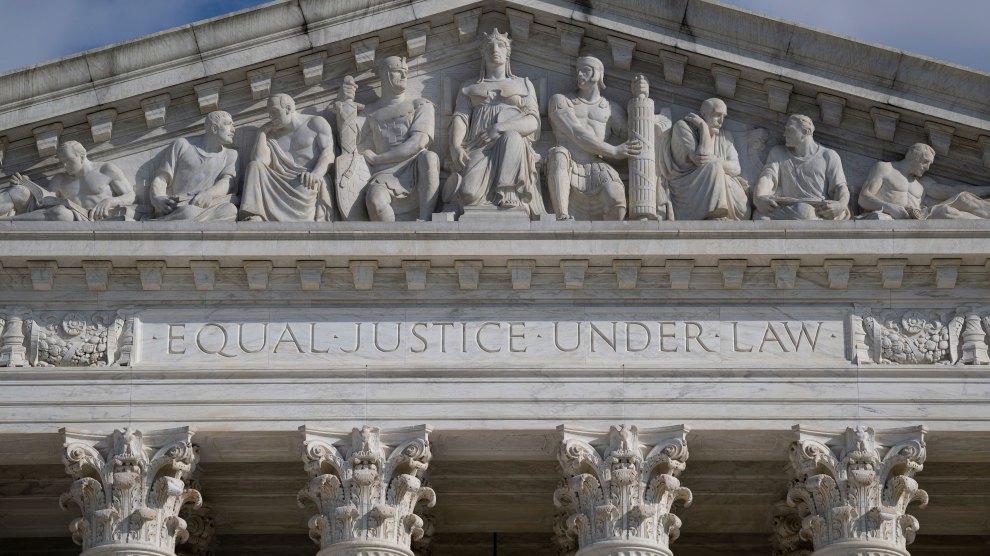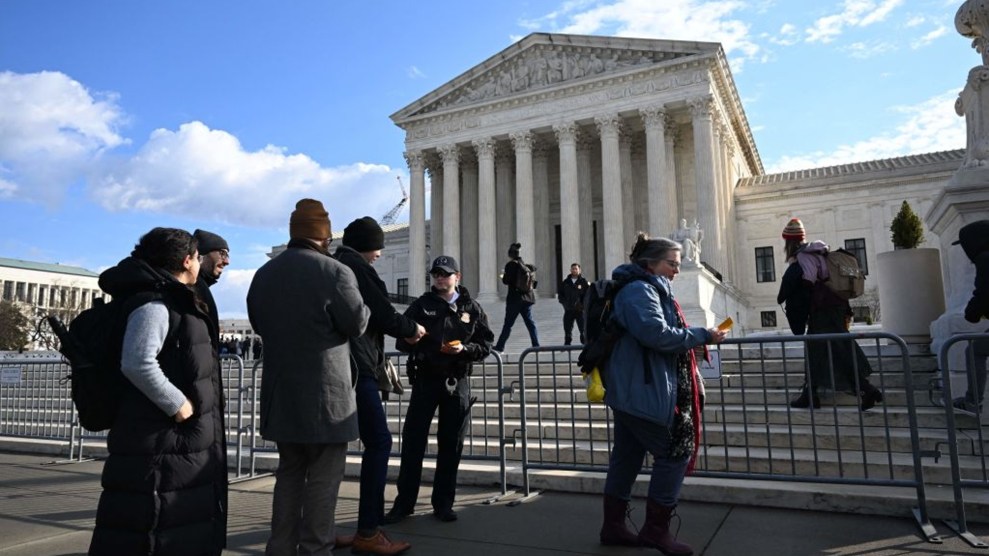
Bryan Olin Dozier/NurPhoto/ZUMA
This story was originally published by Grist and is reproduced here as part of the Climate Desk collaboration.
The Supreme Court could once again hinder the ability of the executive branch to address climate change when it reconsiders the precedent, set almost 40 years ago, upon which many of its efforts rest.
The court announced last Monday that it would hear arguments in Loper Bright Enterprises v. Raimondo. The case, brought by a fishing company based in New Jersey, challenges a federal rule that requires commercial fishing vessels to make room for government watchdogs to monitor for overfishing—a chronic problem within the industry. The federal National Marine Fisheries Service interprets federal law to mean that operators like Loper Bright must pay for these observers. The industry says that’s unfair, but a federal appeals court ruled in favor of the Commerce Department, which includes the Fisheries Service, last year.
The issue at the heart of the case has to do with something called “deference,” a precedent that was set in 1984 in Chevron v. Natural Resources Defense Council. In that ruling, the Supreme Court made a decision that was largely uncontroversial at the time: In the event that a federal law is unclear or silent on a given issue, courts should defer to the government’s interpretation of that statute if it is reasonable. The idea is to allow judges to defer to the expertise of executive branch agencies, such as the Environmental Protection Agency, which many courts were already doing before 1984.
The precedent, which was unanimous, was widely understood at the time to reflect long-standing practice and has in the decades since benefited Republican and Democratic administrations.
In Loper, the question at hand is whether the Fisheries Service’s requirement that commercial operators compensate outside observers is a reasonable interpretation of the law. But because it’s the Supreme Court, the ruling will extend far beyond that particular case.
Chevron deference underpins many federal rules protecting public health, the environment, and other important areas. Federal agencies have invoked it regularly since 1984. The legal principle was an important part of the Supreme Court’s 2007 ruling authorizing the EPA to regulate greenhouse gas emissions under the Clean Air Act. In 2015, the agency used deference to defend its interpretation of the Clean Air Act against the National Mining Association, which argued that the EPA should have considered the costs to industry when writing its hazardous air pollutant rules.
The conservative legal movement has long targeted the power of the “administrative state” and the authority of the executive branch, and this case may be one of the avenues by which the conservative Supreme Court weakens that power.
If the court reverses its ruling on Chevron, it would tilt “the balance of power toward courts and away from agencies,” Michael Burger, executive director of the Sabin Center for Climate Change Law at Columbia University, told Grist. “The concern is that there will be something of a chilling effect on agencies.” The EPA, for example, could shy away from enforcing any regulations that aren’t explicitly within its purview as determined by Congress.
That’s important for a number of reasons, but primarily because the executive branch is how many of the climate and environmental regulations in this country are executed. “Doing away with Chevron deference may give courts even more ability to shoot down federal agency action and limit the discretion that agencies have to exercise the authority that Congress did give them to do big, meaningful things,” Burger said.
The case, which will be heard in the court’s next term, comes before the jurists just one year after the justices, in a 6-3 decision, struck down the Clean Power Plan. The decision to limit the EPA’s regulation of greenhouse gasses was regarded as a blow to climate progress by environmentalists and climate activists. The move armed the fossil fuel industry—and others —with a new weapon against the authority of federal regulatory agencies.
Regardless of how the court rules in Loper, it won’t be the last time it takes a jab at the administrative state, Burger said. “This is certainly not the end,” he said.














